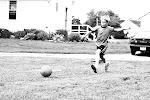I don't know where else to vent. My school district has been discussing the flavored milk issue of late. It might be because I brought it up at a parent teacher meeting. I expressed my concern for the extra sugar the kids get in their milk since they are offered flavor. The principal and the school board member sitting in on the meeting said they'd look into it.
They did. At the following parent teacher meeting, the principal brought the three milks they offer: fat-free, 1% and fat-free chocolate, so that we could look at the labels. The fat free had 80 calories. The 1% had some fat and 100 calories. The fat-free chocolate had 130 calories, no fat, but the second ingredient, after milk, was high fructose corn syrup. Cocoa was such a small amount that it was listed as less than 1% of the total ingredients.
The principal explained that a committee was convened with our food service director, a nutrition director from the local hospital, and one of the elementary school principals to make a recommendation to the superintendent. They said they looked at the research. Their recommendation was to eliminate chocolate milk from the breakfast menu, but still offer it for the milk break and lunches as a choice. Their biggest reason for keeping the choice was that if they limited it too much, they were afraid the milk consumption would go down. Their argument was that it was better for the kids to get all the nutrition of milk with the extra sugar than to not get it at all because they wouldn't drink white milk.
On-line, I've found the National Dairy Council supporting putting
flavored milk in schools. The same reasons were brought up as were listed by the committee that made the recommendation to the principal.
MilkDelivers.org also lists a study about how the consumption drops dramatically if flavored milk is removed and goes on to argue that more calories and fat, half again as much sugar, and more dollars must go into the food then served to make up the difference in the nutrients lost. If these organizations have research and papers supporting it, how can one make an argument against it.
So these things are only upsetting a little. What was more upsetting was the parents at the meeting, whose children are in the same school as mine are, who were so very against removing flavored milk from the school entirely. They came prepared with stacks of research and surveys. One mother said her doctor told her that her child could drink chocolate milk because he wasn't going to drink white milk at all and he needed the nutrients. She was all ready to get a doctor's excuse to bring in chocolate milk if it was banned entirely. She also said she checked with the dentist and that the dentist said it wasn't the cause of cavities.
I cited the
Princeton study out a year ago that rats fed virtually the same diet and the exact same calories, except one group drank sugar water and the other drank HFCS water and they found the HFCS rat group gained more weight and showed more tendencies to obese diseases. To that she said, what's a little HFCS in one drink? I said, well it's all cumulative, isn't it? It's not just in these drinks, but in so much else. Then another mother pulled out a poll she had done at the school. This was the most disturbing to me. She was using it to argue for chocolate milk, because if they didn't have it, she was arguing they wouldn't drink any.
This survey showed that out of 289 students who chose to take milk at milk break, 227 chose chocolate milk, and 62 chose white milk. That's 227 students who chose a milk that had 50 extra calories and 12 more grams of sugar which were all HFCS. That does not count lunch choices. And teachers stated opinions like, "My personal opinion...if they will drink it, what difference does it make if it is chocolate?" "Most kids like chocolate and get a good source of calcium and vitamin D from it. I would rather the children get chocolate milk and the good that it provides rather than juice. ... I was a kid who didn't like white milk and would not have drank milk in school if chocolate wasn't offered. Overall I think chocolate milk does more good than harm."
Another parent stated that it allowed the kids choices and that the kids had to start to learn to make good choices, just like when they are offered alcohol, they have to decide in that moment that alcohol is bad. If our children make the choice for alcohol like they do for chocolate milk, we are doomed. My children, even though we discuss at home better food choices and enjoying making and eating our food, still choose chocolate milk. We have discussed high fructose corn syrup and the rat study and they still choose chocolate milk even though they know it is in there.
I am not a perfect parent. I give in to McDonald's and ice cream and all sorts of things. But I have come to realize this is about their future and conditioning my children to like the healthy choices. If you have sugar sabotaging us all the time, at every corner, and parents who still think, well a little HFCS here and there can't be all bad, it will accumulate and our children will be left with an even worse health care mess. I feel I have no back up in this community. The issue even came up at a party. One parent could see both sides, especially since he had a kid who wouldn't drink milk unless it was chocolate, but he agreed that we had too much sugar drinks as it was and it might be a good change for the school. But people waver when it might mean their children will not get the calcium they need.
My question is, since when did chocolate milk become so ubiquitous? It was a treat at my house when I was a kid. We maybe had it once a week with school lunches, but I honestly don't remember. But I don't remember thinking I could have chocolate milk ever on a regular basis. Where between the late 1970s and now did it permeate our lives and schools? I suppose it is just like soda. It got cheaper to make and buy, we all like sugary stuff and we went overboard. Now, compared to soda, chocolate milk is a "godsend" for those kids that "hate the white stuff" and won't eat anything else calcium related. I am so sad that our attitudes about food have become so warped. What about soy milk, or plain old water?
So I guess I will watch out for my own kids. Some parents suggested I tell my kids' teachers to watch them and make sure they only take white milk. But honestly, should I make the teachers work that much harder just to make sure my kids are not taking chocolate milk? They have so much work as it is.
I thought asking about flavored milks and seeing if they could be really limited or eliminated would be an easier way to start the Food Revolution in our community, but it seems that if this is the reaction to the whole thing, the Food Revolution will have a very long row to hoe in these United States of America.


































